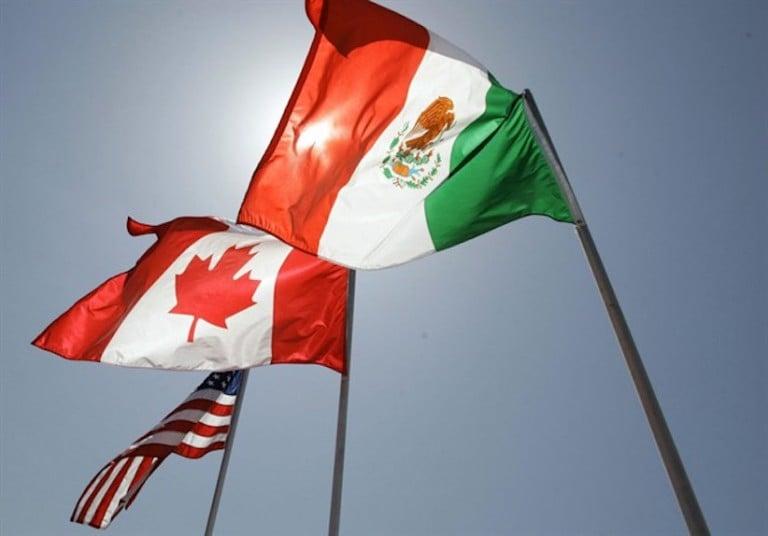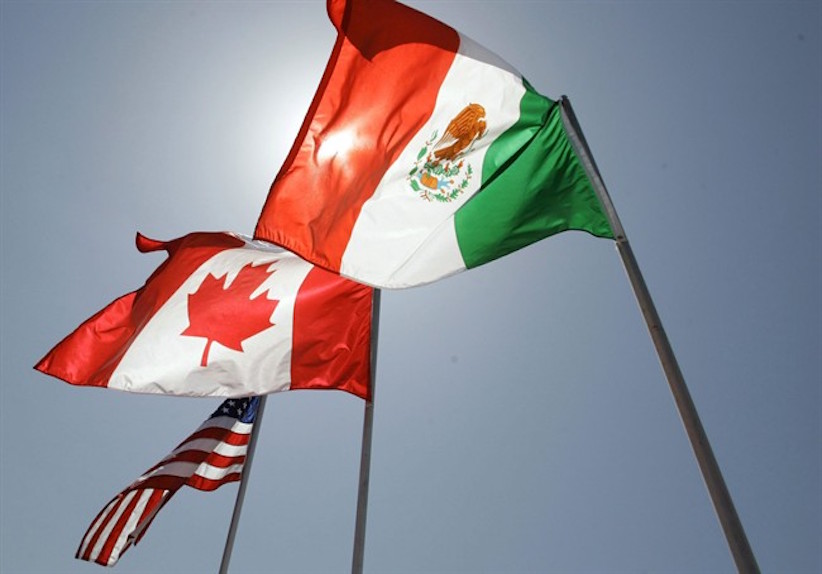Why NAFTA renegotiations need to tackle the digital economy
Opinion: The NAFTA talks represent a crucial opportunity to address and assert Canada’s needs on e-commerce, intellectual property rights, and more

In this April 21, 2008 file photo, national flags of the United States, Canada, and Mexico fly in the breeze in New Orleans. Negotiations start Wednesday for an update to the quarter-century-old North American Free Trade Agreement. THE CANADIAN PRESS/AP/Judi Bottoni
Share

Jacqueline Palladini is a senior economist at the Conference Board of Canada.
There has been a steady flow of fears, criticisms and threats being hurled at the North American Free Trade Agreement (NAFTA) these days—notably by U.S. President Donald Trump. There are many issues at play, from the Chapter 19 dispute process to softwood lumber. But as Canadians, it is paramount that we keep our eyes on the prize. And the bottom line is this: Canada stands to benefit from a renegotiated NAFTA that better reflects our current business realities and digital economy.
What does this mean exactly? NAFTA was created before Windows 95, before Google, before Amazon. The way commerce is conducted and the types of products and services in demand have changed so much since 1994. Yet NAFTA does little for technology companies trying to attract talent across borders. It does little to protect intellectual property in software. It does little to regulate cross-border data flows. On these three fronts, Canada needs to push hard to defend its interests.
Canada depends on digital connectivity in all areas of its economy, from efficient payroll systems, to sensors that monitor the pressure of oil pipelines. Digital connectivity can enable smaller businesses to reach global markets. Canada has a big stake in supporting two-way trade in digital products: In a globalized environment, Canadian businesses source and purchase production inputs online and make use of digital technologies and data to reduce costs and increase efficiencies and even innovate. Canadian exporters create digital products, ranging from video games and movie effects, to intermediary software used in financial transactions; Canada is also quickly becoming a leader in autonomous vehicle technology and its corresponding software. But all of these gains rely on a strong and seamless digital connection to the world.
To that end, a modernized NAFTA, one that’s in line with Canadian interests, would address the movement of people across borders, balance out intellectual property rights, and improve e-commerce. Several of the recommendations we’ve made in a recent report, NAFTA 2.0 and Canada, are straightforward concrete improvements. First, we recommend a provision preventing countries from imposing customs duties on products and services delivered electronically in order to support Canadian exports, whether they be digital products or just products sold online. We also recommend NAFTA’s list of professional occupations be updated and rules be clarified around business visitor visas. This will allow digital professionals and investors to meet face-to-face with potential customers to sell their products and train customers how to use them—unlocking business opportunities on all sides of the borders, including in software, technology, and digital trade.
There are some caveats. Digital players like Amazon often deliberately seek monopolistic market domination, and while this isn’t too concerning when it comes to niche markets, it can be a big problem when a company dominates entire industries by driving out competition. Facebook and Google, as another example, are collecting two-thirds of online ad spending in Canada, leaving little for Canadian media outlets and putting their survival at risk. Therefore, we need some thoughtful flexibility built into NAFTA to allow for Canadian competition in a winner-takes-all world. For example, we recommend maintaining NAFTA’s current broad cultural exception in NAFTA 2.0, which would ensure that Canada keeps its ability to support cultural content, whether delivered digitally or not.
Things get murkier still when you consider Canadian data privacy protection. Some 90 per cent of Canadian internet traffic is routed through the U.S., whether it be social media, email, or cloud-based data warehousing used directly or by another company. Under the USA Patriot Act, the U.S. government can access the content, putting Canadians’ data privacy at risk, and in its goals, the U.S. said that it seeks to “ensure that NAFTA countries do not impose measures that restrict cross-border data flows and do not require the use or installation of local computing facilities.” These restrictions and requirements can hurt businesses and keep them from expanding beyond their borders. A balance must be found between data protection and rules that enable trade and innovation.
While international trade in products has stalled, cross-border data flows have quadrupled since 2012, and are set to grow fivefold in the next five years. But the rules of trade have not caught up to these realities. We need clear rules on digital trade, and in what appears to be a once-in-a-generation opportunity to modernize a 20th century deal to reflect a 21st century world, Canadians must seize it.
MORE ABOUT NAFTA:
- Mexico draws a line on Trump’s NAFTA threats
- NAFTA: Unpacking the North American auto industry
- Inside Canada’s plan to stop Trump from ripping up NAFTA
- Can Donald Trump pull the U.S. out of NAFTA all on his own?
- Trump suggests terminating NAFTA, calls Canada “very difficult”
- Trump vs. his party: Spat spills into NAFTA
- Climate change still a NAFTA priority for Canada
- Litigation looms in ongoing softwood lumber fight